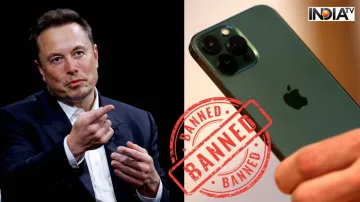Musk to ban Apple device over OpenAI integration, citing security concerns
Musk has taken a bold stance against Apple’s integration of OpenAI, showcasing his reflects deep concerns about security and the future direction of AI technology.
Elon Musk, CEO of Tesla and SpaceX and owner of X (formerly known as Twitter) has made a startling announcement. Musk declared that he would ban the use of Apple devices in his offices and the premises of his companies. The decision was made when Apple announced a new move for integrating OpenAI technology into its operating systems.
Security concerns over AI integration
Musk voiced strong concerns about the security implications, describing the potential integration of OpenAI into Apple's OS as an ‘unacceptable security violation’.
He stated that Apple employees and visitors, visiting the premises of his organisation would be required to leave their Apple devices at the door of the company- they would store them in a Faraday cage to block any electronic communication.
This move, which is considered dramatic highlights the stance on the potential risks which has been posed by such technological integration.
Apple’s AI push at WWDC 2024
The move was taken just after Apple’s latest announcements were made at its Worldwide Developers Conference (WWDC) 2024. Apple stated that a range of new AI features will be integrated into iOS devices and other product lines- highlighting the debut of Apple Intelligence, which is a significant AI upgrade to Siri. The new operating systems (OS) like iOS 18, VisionOS 2, iPadOS 18, WatchOS 11 and macOS Sequoia.
Apple also announced a strategic partnership with OpenAI to integrate ChatGPT- whose capabilities will now be in the devices. This is considered a significant step in their AI strategy.
Privacy reassurances from Apple
In response to potential privacy concerns, Apple has further emphasised artificial intelligence and its further enhancements which would prioritise user privacy.
The tech player is planning to use a combination of on-device processing and cloud computing to maintain device security.
This approach aims to balance the powerful capabilities of AI with the need to protect user data. Despite these assurances, Musk reportedly remained skeptical, criticising Apple’s reliance on OpenAI and by questioning the privacy safeguards.
Enhancing user control and personalization
Beyond AI, Apple has been overhauling its Control Center to enhance user customization and functionality. The updated Control Center will allow users to integrate controls from third-party apps, rearrange control layouts, and modify controls on the bottom lock screen, providing a more personalized and adaptable user experience.
Industry reactions and Musk's history with OpenAI
Ben Bajarin, the CEO of Creative Strategies, have commented on Musk’s declaration, which has suggested that it is unlikely to gain widespread support. He further noted that Apple's strategy includes educating users about the security of their private cloud systems, which is claimed to offer the same level of data anonymization and protection as on-device storage.
Musk's criticism is very much notable which has been giving historical connection with OpenAI.
To recall, Musk was one of the co-founders of OpenAI in 2015, and he was on the initial mission to create AI that benefits the public welfare. However, earlier this year, Musk filed a lawsuit against OpenAI and Sam Altman (its CEO), accusing them of deviating the mission towards profit-driven objectives.
This lawsuit further highlighted the complex and evolving relationship between Musk and the AI entity he helped establish.
ALSO READ: TCS partners with BSNL in Rs 15,000 crore 4G deal- Tata to work on fast internet service in India
ALSO READ: Infinix Note 40 Pro 5G Review: Decent performer with wireless charging capabilities
